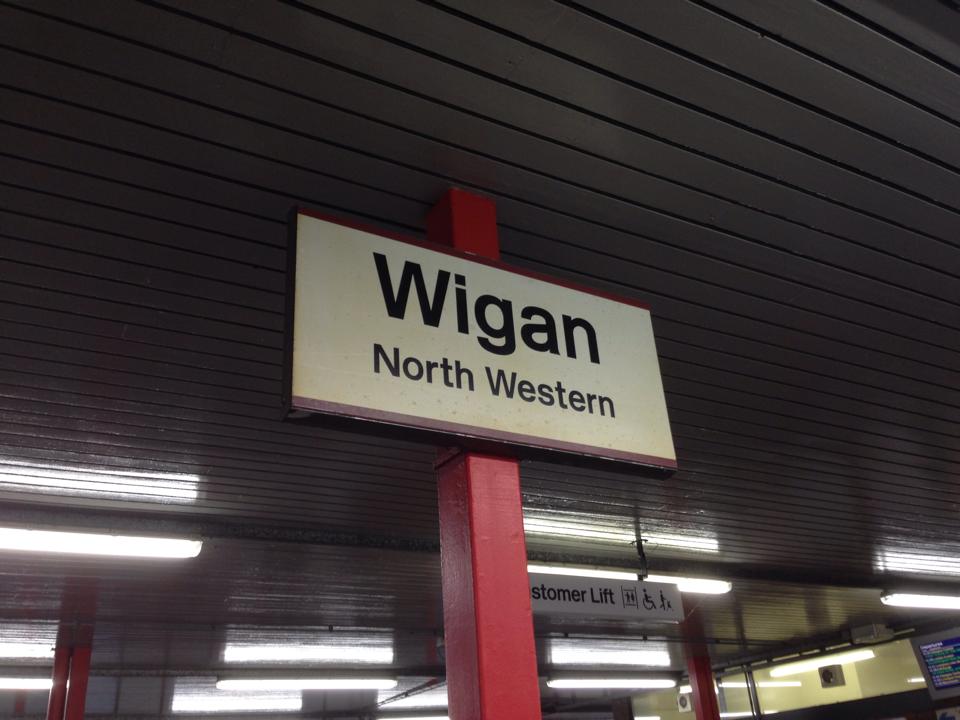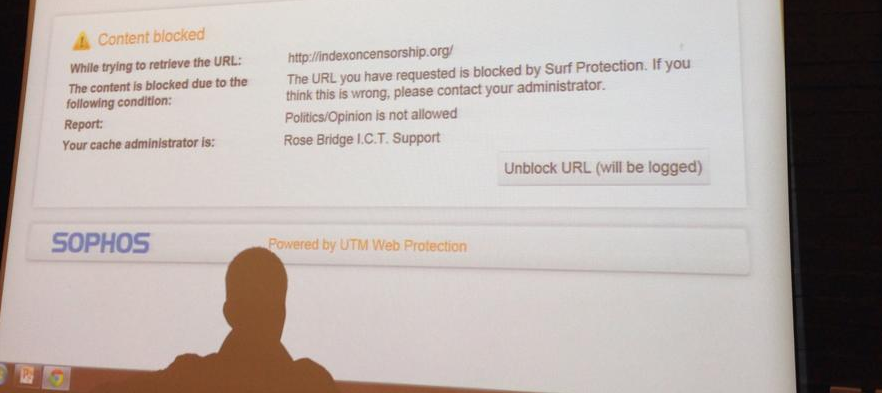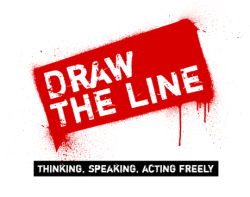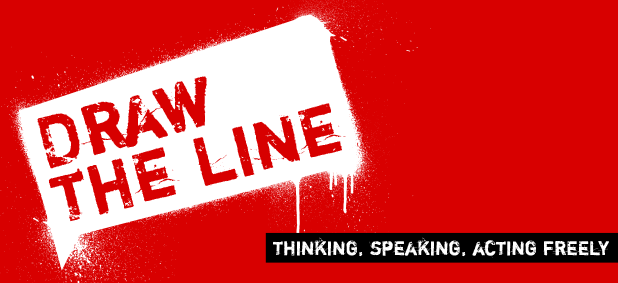1 Nov 2014 | Draw the Line, Events, United Kingdom
Index held a successful workshop with the north west contingent of the British Youth Council, despite the inability to access our own website because of internet filtering at the location.

Index held a third Draw the Line workshop with the British Youth Council, but this time with its groups in the north west of England at their regular regional convention. Before the workshop began we faced a problem — we couldn’t get onto our website. The convention was held in a local secondary school and the school’s server was blocking our website. This is unusual, but with highly sensitive school internet filters it was possible that there were too many words deemed unsuitable for children used on our website. This filter appeared to be more sophisticated and specified the reasoning behind blocking our content: “Politics/Opinion is not allowed”.

It was difficult to test how far this stretched, but it was alarming that politics or opinion would be blocked at a school limiting its pupils’ ability to research different points of view.
We spoke to youth workers at the convention who said they faced similar problems when trying to do projects with young people on LGBTQI issues or drugs. The filters were so sensitive that they would not even allow students access to the websites of support groups which cover these issues, it simply blocked them all.
Despite the censor’s best efforts this made a great starting point for the debate and demonstrated to the participants the levels of censorship that we all face in our daily lives. The groups were able to articulate many different current and historical instances of censorship from wartime propaganda to being forced to wear a school uniform and understood why freedom of expression is fundamental to human rights.
The discussion moved onto the latest Draw the Line question, “Are voting restrictions a violation of human rights?” The members enthusiastically debated the prospect of voting at 16 (this is one of the British Youth Council’s campaigns) with the group still split on whether this should be implemented into UK law. There was also a great opportunity to discuss these issues with the youth workers in the region and find out how social media restrictions can both harm and protect children and how we can begin to define the difference.
Wigan pier is one of the unique locations around the world where the Index on Censorship magazine is available to download for free. It was nominated as a free speech spot because of George Orwell’s novel, The Road to Wigan Pier. Find out more on how to download your copy here.
This article was posted on 12 Dec 2014 at indexoncensorship.org
16 Oct 2014 | Draw the Line, Youth Board

This month the Index Youth Advisory Board is discussing legal regimes and how they nurture or stifle the free expression of ideas. Examples of draconian laws abound: from Russia’s law banning “homosexual propaganda” to the UK’s use of RIPA legislation to violate the confidentiality of journalists’ sources.
When it comes to free speech: laws, what are they good for?
Legal frameworks protect speech and broader free expression. Take for instance Article 19 of the Universal Declaration of Human Rights which tells us that we all have the right to freedom of opinion and expression. Most of us, I’m sure, would cherish this right – who wouldn’t want to be able to express themselves freely and say what they like without the interference of the state?
In the United Kingdom, Article 10 of the Human Rights Act grants citizens freedom of expression. Most countries have different forms of Article 10. It is these laws – the ones that promote and protect our right to free speech – that form the crucial pillars of any democracy.
But do all laws protect our right to free speech?
Article 10 does a good job of granting us the confidence to speak out and ensure our voices are heard, but do other laws do the same? Or are there laws that, in some way, serve to restrict free speech? The example from Russia underline the use of legislation to restrict the right to expression. The law also curtails the right to assembly, another important part of a democratic society.
When you look into Article 10 itself, you begin to learn about the restrictions of the law and begin to understand how, in many ways, the state still does have authority over our freedom of expression. For example, Article 10 can be restricted “in the interests of national security” and in order to “maintain the authority of the judiciary”.
And what about the countries that don’t have specific laws that promote freedom of expression as strongly as the UK’s Article 10? Many may find it easy to conclude that countries like Iran have more laws that serve to restrict free speech, rather than protect it. It’s interesting to look at blasphemy laws in this instance to examine whether it protects the rights of those who are religious or restricts the rights of those who wish to criticise religion.
This month on Draw the Line, we discuss the impact a country’s laws have on our freedom of expression. Join the discussion and let us know whether laws serve to protect or restrict your right to free speech.
This article was posted on 16 Oct, 2014 at indexoncensorship.org
11 Sep 2014 | Draw the Line, Youth Board

Free expression and policing can have an antagonistic relationship. Recent events in Ferguson are demonstrative of the issues that arise as the demands for protest clash with those for civil safety.
The police are naturally drawn to the forefront of such a debate as they become the physical manifestation of a state’s commitment to free expression and the right to protest. Thus, as the Obama administration launches a federal investigation into whether the Missouri police systematically violated the civil rights of protesters, it is prescient to ask whether one can demand more of the police to protect free expression.
Undoubtedly, enforcement agencies across the world play a tricky role in facilitating expression while protecting the legitimate safety concerns of the local community. Between 2009 and 2013, police in England spent £10 million on security arrangements for EDL marches. There can also be a huge social cost to galvanic protest and the director of Faith Matters, Fiyaz Mughal, has called for a ban on such marches, claiming that “[We] know there is a corrosive impact on communities, it creates tensions and anti-Muslim prejudice in areas. I think enough is enough. I think a banning order is necessary with the EDL”.
What the recent altercations in Ferguson illustrates is that the role of the police in safeguarding free expression must not be overlooked. More importantly, this is a global issue and as six activists being retried for breaching Egypt’s protest law have started an open-ended sit-in and hunger strike it must be remembered that this debate truly gets to the heart of the basic demands of any civic society.
As scenes from Ferguson have at times resembled the images of police crackdowns in Cairo it is clear that complacency about such issues can prove disastrous. It therefore seems vital to drawn certain lines as to where we feel the police should stand when it comes to creating the basis of a safe but also free society.
This article was posted on 11 Sept 2014 at indexoncensorship.org
12 Jun 2014 | Draw the Line, News and features

To celebrate the start of the World Cup 2014, Index is kicking off its new debating section: Draw the Line. We want to hear your thoughts on key free expression issues of the day and this is your opportunity to share them.
Each month, our Youth Advisory Board will choose a free expression topic and encourage readers to respond to the issues it raises. This month, we are asking ‘Good sports: Which free-speech offending countries should we blow the whistle on?’ You can read more here about why Brazil 2014 is not the only sporting event to ever cause controversy in the free speech arena and then get involved by posting your responses on social media using the hashtag #IndexDrawtheLine. Check back on the page to see who is saying what and get debating.
Draw the Line also features pieces from our Young Writers/Artists programme as well as relevant features from our award winning quarterly magazine. For more information on our youth work, contact [email protected]




